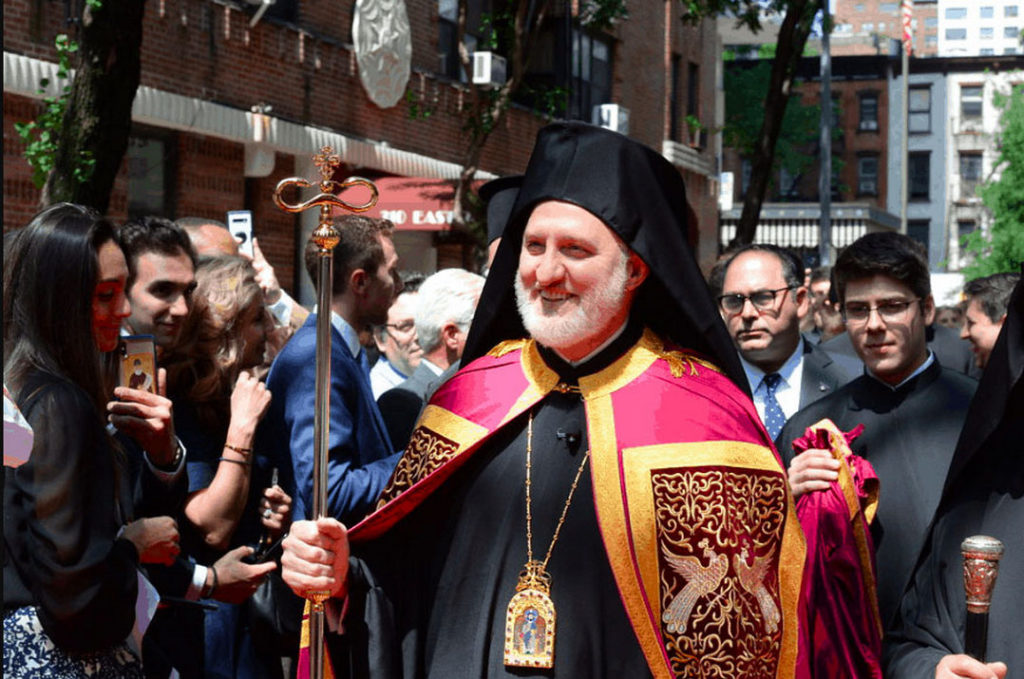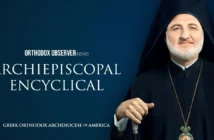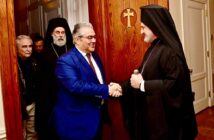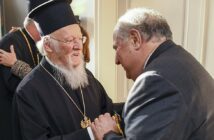Source: Orthodox Christianity

Photo: greekcitytimes.com
The appointment (one can call it “election” only in the narrowest etymological sense) of Metropolitan Elpidophoros (Lambriniadis) as Archbishop of the Greek Orthodox Archdiocese of America will no doubt be remembered as a significant turning point in the history of the Twenty-first Century Church. Whatever hope might have existed that the schism between Constantinople and Moscow over Ukraine is merely a temporary, unimportant event has surely now been extinguished
Archbishop Elpidophoros is a distinguished and knowledgeable theologian. As a Turkish citizen, he is a leading and obvious candidate someday to succeed His All-Holiness Bartholomew on the Ecumenical Throne. In the major controversies of Bartholomew’s reign (the Cretan Council as well as the Ukrainian schism) he has consistently and staunchly defended the Patriarch’s positions and authority. While there is no reason to doubt the sincerity with which he has taken these stances, it is evident that he has a vested interest in strengthening a presently feeble jurisdiction which he is one day likely to command.
Thus his appointment to the second-most powerful post in the Ecumenical Patriarchate has a two-fold significance.
On the one hand, it telegraphs that there is unlikely to be any backtracking at the Phanar when Patriarch Bartholomew leaves the scene. On the other, it raises the theological stakes, because Archbishop Elpidophoros does not consider the Ukrainian affair a trivial matter of reasserting Constantinopolitan control over a wayward province illegally dominated for a few centuries by Moscow.
On the contrary, he uses the most serious term of opprobrium in all of Orthodoxy to describe his opponents, one the Phanar generally goes out of its way to avoid employing. He says they are heretics.
In 2009, then-Archimandrite Elpidophoros delivered a memorable speech at Holy Cross School of Theology which may still be found online, for example at https://www.aoiusa.org/ecumenical-patriarchate-american-diaspora-must-submit-to-mother-church/. In this speech he makes the following interesting statements, which he has elsewhere expanded into his well-known thesis that the Ecumenical Patriarch is “primus sine paribus”:
“Let me add that the refusal to recognize primacy within the Orthodox Church, a primacy that necessarily cannot but be embodied by a primus (that is by a bishop who has the prerogative of being the first among his fellow bishops) constitutes nothing less than heresy. It cannot be accepted, as often it is said, that the unity among the Orthodox Churches is safeguarded by either a common norm of faith and worship or by the Ecumenical Council as an institution. Both of these factors are impersonal while in our Orthodox theology the principle of unity is always a person. Indeed, in the level of the Holy Trinity the principle of unity is not the divine essence but the Person of the Father (“Monarchy” of the Father), at the ecclesiological level of the local Church the principle of unity is not the presbyterium or the common worship of the Christians but the person of the Bishop, so to in the Pan-Orthodox level the principle of unity cannot be an idea nor an institution but it needs to be, if we are to be consistent with our theology, a person… In the Orthodox Church, we have one primus and he is the Patriarch of Constantinople.”
Note first the phrase “constitutes nothing less than a heresy”.
Note second the theologoumenon that the person who acts as the principle of unity for the Church Universal is not Christ Himself, but rather some bishop.
Note finally that the bishop in question is not (as a naively literal reading of the Holy Canons would seem to indicate) the bishop of Rome, but that of New Rome. (This latter is a serious point much neglected in the present controversy. Whatever the role of the Primus may be in Orthodoxy—i.e. whether he is “primus inter pares” or “primus sine paribus”—there is no doubt that for centuries the historical Primus was the Roman Pope. The only reason for rejecting Roman primacy today is that the Roman Church has abandoned Orthodox teaching. And yet Constantinople, with its lifted anathemas, has more than any other Orthodox Patriarchate seemed to imply that no such apostasy exists. How then can the Phanar claim to be essential to the Church, when the Vatican would have to have a stronger claim? If the ecumenical movement were to succeed and full communion with Rome be re-established, would Constantinople gladly cede its primacy? And how does the existence, if only formerly, of Orthodox Rome agree with the Phanar’s claim that the Church “cannot exist” without the Patriarch of Constantinople?)
Perhaps his words are subject to misinterpretation, but Abp. Elpidophoros seems to believe that the Ecumenical Patriarch is a sort of Pope, the Vicar not of Christ, apparently, but of God the Father! He also seems to believe that those who disagree with this view are heretics.
This is a rather more serious claim than “You know, now that the USSR is gone, there really should be an autocephalous Ukrainian Orthodox Church free from Moscow.”
How can world Orthodoxy maintain communion with a Patriarchate that promotes an alien ecclesiology, and refers to those who object as “heretics” (a term it does not apply to Roman Catholics and Protestants)?
There is another aspect to Elpidophoros’s elevation that the 2009 speech also illuminates. Although the Phanar has historically been very opposed to ethnophyletism (in part to stop the incursions of the Bulgarian and other churches into its canonical territory), it is a matter of historical record that the Patriarchate has always seen itself as the bulwark of Greek nationalism. (Patriarch Bartholomew himself would probably neither deny this nor see any problem with it, as is clear from his 2018 remarks about the “precedence” of “our people”.)
In his speech, delivered at America’s only Greek seminary, Elpidophoros is largely concerned with this exact issue. He says that “ecumenicity is the heart of Hellenism and by definition alien to any form of nationalism or cultural chauvinism.” He adds that “diaspora” refers not to people temporarily living in lands beyond the Roman Empire, but to those who live there permanently. Nevertheless, in a seeming contradiction, his vision of these people is limited to immigrants from traditionally Orthodox countries and their progeny. His primary concern is the maintenance of (in this case Greek) culture and tradition without assimilation, and he has this to say about “converts”:
“Another great number of candidates to the priesthood come from converts, who possess little, if any, familiarity with the Orthodox experience and they are usually characterized by their overzealous behavior and mentality. It is of interest that the converts who become ordained into priesthood represent a disproportionally greater percentage than the converts among the faithful. The result of this disanalogous representation is that, more often than not, convert priests shepherd flocks that are bearers of some cultural tradition, but because their pastors either lack the necessary familiarity with that tradition or even consciously oppose it, they succeed in devaluing and gradually eradicating those cultural elements that have been the expression of the parishes that they serve.”
While this is a legitimate concern, it is notable that Elpidophoros nowhere talks about an evangelical mandate to bring Americans as a whole into Orthodoxy, nor does he discuss parishes which do not have a single (or any) ethnicity. In the context of a talk at a seminary (where the Dean at the time was named Fitzgerald) the speech seemed to have a clear message summed up in the sarcastic nickname some people gave to it: the “Too Many Xenoi” speech.
I am a xenos. So far as I know, the interaction of my post-Schism ancestors with Orthodox Christians was limited to fighting them on the Eastern Front. My wife and I converted to Orthodoxy in 1988 at the OCA cathedral in Boston. We were the founders and editors of the now-dormant Saint Pachomius Library, one of the first Orthodox patristics websites, in 1994. We used to teach Church history online, and I was involved for a number of years in Orthodox evangelical outreach to the Rastafarian sect. In 1997, we moved from Boston to Lubbock, Texas, where I was ordained a reader in GOARCH and served as a chanter at Saint Andrew Greek Orthodox Church until last October.
Lubbock is a university town with a population of about a quarter-million. It lies in the center of the Llano Estacado, a vast thinly-populated plateau straddling the Texas-New Mexico state border. The first Orthodox in Lubbock were probably Lebanese merchants who arrived around 1900, but there was no parish until a few Greeks decided to found one in the 1970s. They succeeded, after great struggle and many difficulties: Lubbock, although fairly large, is invisible to most Americans because of its isolation. St. Andrew did not have a priest until 1996; before that, people would drive over 100 miles to Amarillo for liturgy.
When my wife and I arrived, we were not sure what to expect. We found a parish that was part of the Greek Archdiocese, but also very multi-ethnic and welcoming. The liturgical rubrics and music were Byzantine, but the services were entirely in English, and every effort was made to accommodate people of different backgrounds: Greeks of course, and converts, and Arabs, Ukrainians, Russians, Serbs, Romanians, Bulgarians… and probably members of other nationalities I am forgetting. The “Greeks” in the parish were themselves a mixture of recent immigrants and families that had been in the US for several generations. Both of the priests who served in my 21 years at Saint Andrew parish were graduates of Saint Vladimir’s (OCA) Seminary.
The parish was not utopia, but it had its successes. Two of the parish’s young men (both of them converts, as Archbishop Elpidophoros might have predicted) went on to become priests of the Greek Archdiocese, a remarkable record for a parish so small and young by Greek standards. They are both, I might add, outstanding, even saintly, clergymen. One of them, whom I especially admire, was featured on the national GOARCH webpage in March. Neither of them answers to Abp. Elpidophoros’s caricature of the convert-priest as a fanatic ignorant of Greek culture (indeed, both of them married Greeks!)
My wife and I were very impressed by the generosity of the Greek parishioners at St. Andrew, their commitment to the religious education of their children, and above all by their sheer persistence in keeping alive a parish in an uncomprehending Protestant fundamentalist town, ignored by the rest of the country, always on the edge of financial collapse. At least twice, the parish seemed certain to close; once it was saved by an “anonymous” donation actually from the diocesan bishop, a very good and holy man.
Then in 2018, the current schism happened. My wife and I had been unhappy with the direction of the Greek Archdiocese for some time (I had been parish council president during the Council of Crete) but had always managed to convince ourselves to stay, if only because there was nowhere else to go: The Amarillo parish 100 miles away was still the nearest, and it, too, is Greek. Moreover, we did not want to cause a division in the already embattled local community; we respected our metropolitan; and (as I remember saying on more than one occasion) “If this were really heresy, and not just rhetoric, surely at least one of the other Orthodox churches would break communion over it”.
The Ukraine issue, however, made Patriarch Bartholomew’s more-than-papalising claim of being “primus sine paribus” impossible to ignore. We decided to leave the parish and to hold reader’s services privately. We did not, however, tell anyone what we were doing except for the parish priest. We did not wish to be seen as sowing dissension, and we still hoped that the affair would be resolved in a few weeks. Then we found out that other people had noticed our absence, and eventually we decided to announce publically that we were starting a new parish, under the protection of St. Catherine of Alexandria.
At first we had no place to meet, so we met outdoors, at a park bench on the university campus, with the dome of heaven over our heads, flocks of pigeons (and the occasional hawk) circling above us. A few joggers looked at us in amazement, but for the most part, we were ignored. For three months, this was our church.
I had imagined that once we announced our existence, many of our fellow-parishioners at Saint Andrew would wish to join; after all, the theological issues seemed rather clear-cut. This did not happen. Instead, the old parish split along neatly ethnic lines. Nearly all of the parishioners who came from the former Soviet Union joined our group; almost no-one else did. (It might interest Archbishop Elpidophoros that the converts have—so far—stayed with GOARCH.)
This is the tragedy of what is happening: an already barely-viable multi-ethnic parish has become two. Our parish is, I am confident, the Orthodox one, and the other is in schism. But this is not the fault of the remaining parishioners of Saint Andrew. Few if any of them care at all about Constantinopolitan hegemony, much less Ukrainian autocephaly. For them, the parish of Saint Andrew is the Orthodox church, the church they or their parents built from nothing with sweat and sacrifice, the church where they were baptized or married or where they expect their funerals to be served. It is where they have met the Lord every Sunday in the Eucharist. Perhaps it is as impossible for them to leave GOARCH as for French peasants in the Twelfth Century to have repudiated papism; for them, it would be “leaving the Church”.
But with the elevation of Archbishop Elpidophoros, surely that is what things are coming down to.
At the mission parish of Saint Catherine, we have had rapid progress. We were accepted into the Russian Orthodox Church Outside of Russia almost immediately. The well-known Dean of Texas, Fr. John Whiteford, has been named our acting Rector; although distance has prevented him from yet visiting in person, we have had two liturgies served by Hieromonk Aidan (Keller) from Austin.
We no longer have to worship on a park bench; an Anglican parish allowed us the use of their abandoned Sunday School chapel, complete with amusing stained-glass windows depicting happy 1930s children from around the world. A parishioner (Alexey Ageev, who deserves mention by name) built a traditional wooden altar and donated some hundred icon prints. God willing, through the prayers of St. Catherine the Great Martyr (and of St. Andrew the First-Called!), we will perhaps, despite our sins and weaknesses, be able to ensure a witness for Christ on the Llano Estacado.
But what about the other parish? What about the Greek “diaspora”? How will they fare under Archbishop Elpidophoros?
The year is now 1055.




1 Comment
This sad article, “IT’S 1055 IN LUBBOCK,” gave me pause to reflect on the condition of the GOA. It provides, however, an opportunity to acknowledge that the Church is comprised of parishes. From 1978 to 1989, I was the first parish council president of St. Andrew G.O. Church in Lubbock, Texas. During this time the fledgling community organized, received a charter, received part time clergy and raised money for a permanent building that was built after my tenure and departure from Lubbock. Bishop Kallistos of Zelon of blessed memory wisely knew how to establish a parish. Following’ his instructions, the parishioners met every Sunday, worshiped using the typica service when a priest was not available for Liturgy and provided religious education for adults and children. This required much time and treasure from the members. Small parishes throughout this country and, especially, in the Denver Metropolis have similar stories of faith and dedication.
The challenges of small parishes are numerous. Growth is critical to their survival. Starting another parish at the expense of another as recently occurred in Lubbock is harmful. It is even more harmful, than whatever errata transpire at higher levels.
In my opinion, it is the faith and dedication in all of our parishes that keeps our Church functioning. Rather than fixate on the myriad past disappointments made by the Archdiocese and the Patriarchate, I hope the hierarchy will seek to better understand the needs of our parishes and support them. To this end, let me share these suggestions:
• Use membership statistics and trends as well as feedback from the parishes to determine ways to enable parishes to grow.
• Recognize that English is our common language. There were no hymns or prayers in English at the enthronement on June 22.
• Determine how can we retain our youth, as well as attract young men to the clergy.
• For full financial transparency, publish monthly income statements and balance sheets for the Archdiocese, all Metropolises, Holy Cross/Hellenic College, St. Nicholas Shrine and other institutions.
May we focus on Christ, Our Lord, and pray for the fruits (from Galatians 5:22-23) of the Holy Spirit: love, joy, peace, patience, kindness, generosity, faithfulness, gentleness, and self-control.